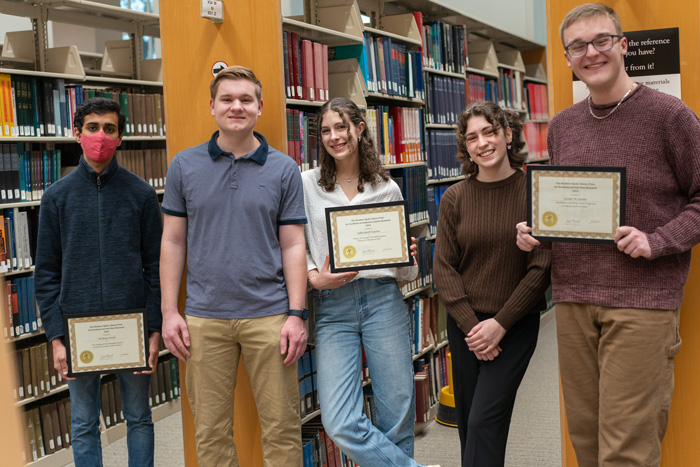Dickinson Celebrates Outstanding Research & Writing

This year's winners, from left: Adi Chacko, Braden Weese, Sofia Getoff-Scanlon, Zoe Selig and Hunter Golder. Not pictured: Heidi Beardsley. Photo by Dan Loh.
Waidner-Spahr Library and First-Year Seminar Prizes Highlight Top Student Work Each Year
Dickinson is proud to announce the winners of its annual FYS Excellence in Writing Award, the Prize for Excellence in First Year Research and the Research Prize for Sophomores or Juniors. These awards recognize students who go above and beyond to demonstrate exceptional research skills and mastery of the written word.
Waidner-Spahr Library Prize for Excellence in First-Year Research
This research prize is designed to recognize and reward first-year students who produce exceptional research projects, with top students taking home $100 and a certificate.
2023-24 Winners
“This is one of the most outstanding essays that I have received in 10 years of teaching the English department's 200-level gateway to the major proseminar,” says Associate Professor of English Jacob Sider-Jost, of "Like Mother, Like Writer: Poetic Pregnancy in Virginia Woolf's Orlando," a winning paper submitted by Hunter Golder ’27 (English). "The paper contains intelligent, sensitive close readings, showing understanding of Virginia Woolf's language in context, and ... is elegantly written and a pleasure to read.”
Adi Chacko ’27 (physics) won this research prize for his paper "The Paradox of the Manhattan Project: Achieving Innovation Under Secrecy," written for his first-year seminar, "Atomic Peril: The History of the Atom Bomb," taught by Kendall Thompson, information literacy librarian. He selected historical primary resources to shed light on the ways that secrecy was maintained around the Manhattan Project, an initiative that involved the hiring, relocation and employment of tens of thousands of employees.
Waidner-Spahr Library Prize for Excellence in Student Research for Sophomores or Juniors
This prize recognizes a student who produces an exceptional research project during sophomore or junior year. These projects include such works as research papers, multimedia projects, lab reports, position papers, posters and field research studies.
2023-24 Winners
“Sofia designed an interdisciplinary critical edition of E. M. Forster's 1924 novel A Passage to India for a political science audience,” says Wendy Moffat, Professor of English and John J. Curley '60 & Ann Conser Curley '63 Faculty Chair in Global Education, of the entry by Sofia Getoff-Scanlon ’26 (Spanish & Portuguese studies, political science), “Politics and Passage: The Political Science Edition of A Passage to India.” “Her acuity in finding and organizing sources relevant to her readers and her crystalline editor's introduction are to the highest standards. It's a remarkable, lucid interdisciplinary work, cognizant of social history, religion, politics, post-colonial theory and literary studies.”
For her “Climate Resilience in Carlisle and Cumberland County: Health and Wellbeing,” Heidi Beardsley '25 (data analytics) interviewed Cumberland County professionals about how climate change impacts their work and drew from a broad range of scholarly and local government resources. The report was created as a part of Beardsley's participation in “Building Climate Resilience at Dickinson and in Central Pennsylvania,” an initiative of Dickinson, the borough of Carlisle, and Cumberland County.
First-Year Seminar Excellence in Writing Awards
Established in 2010, the FYS Excellence in Writing Award recognizes up to three first-year Dickinson students who display mastery of the learning outcomes on the FYS Writing and Information Literacy rubric. All nominated papers are read and evaluated by a panel of writing program staff, along with faculty and students.
2023-24 Winners
Journalism is often viewed as a genre of writing that should only objectively describe the "truth.” In her "Journalism, Done Well(s)," Zoe Selig ’27 (undeclared) challenges this idea by advocating that journalism not only speaks truth but speaks truth to power. By evoking the work of journalist Ida B. Wells and her reporting on lynching in the American South, Selig argues that "in circumstances where those in power are stifling the facts ... merely the act of speaking the truth is a tremendous act of protest," describing for the reader how Wells made white supremacy and its horrific effects visible to the country and paved the way for contemporary journalism.
In his "An Analysis of the Role of the Democratic Party in the Development and Implementation of Mass Incarceration and the War on Drugs," Braden Weese ’27 (undeclared) takes on the idea that the complex history of the U.S. carceral state is easily reduced to a narrative in which the mass incarceration of African American men originated solely from Republican "law and order" polices of Nixon and Reagan. Weese argues that this narrative misses the significant ways in which Democrats have also been complicit in the creation of this prison industrial complex, from Bill Clinton's advocacy of the 1994 "three strikes" law to Joe Biden's role as a U.S. senator in passing the Sentencing Reform Act of 1984.
“Both Zoe's and Braden's papers were recognized by the evaluators as being compelling, showing evidence of critical thought and being attentive to the needs of their audience,” says John Katunich, director of the writing program. “Perhaps most importantly, these papers were identified as excellent models for future writers in their first year at Dickinson.”
TAKE THE NEXT STEPS
Published March 19, 2024